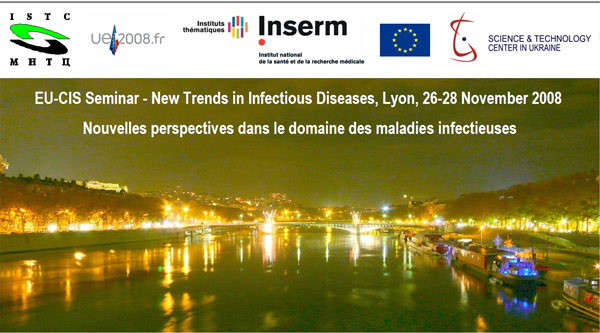Seminar on New Trends in Infectious Diseases, 26 - 28 November 2008


Organized by
The National Institute of Health and Medical Research (Inserm)
The International Science and Technology Center (ISTC), and
The Science and Technology Center in Ukraine (STCU)
With the support of the European Commission
Lyon – France
Mercure Grand-Hotel Saxe Lafayette
26 - 28 November 2008
The EU-CIS Seminar – New Trends in Infectious Diseases, Lyon, France, 26 – 28 November 2008, is organized in the frame of the French Presidency of the European Union by the Institut National de la Santé de la Recherche Médicale (INSERM), the International Science and Technology Center (ISTC) and the Science and Technology Center in Ukraine (STCU), with the support of the European Commission.
Theme of the Seminar:
In 1877, Louis Pasteur and Robert Koch discovered the growth inhibiting effects of Penicillium sp on Bacillus anthracis. However, it took more than 30 years before modern research on antibiotic therapy began by Paul Ehrlich and his contemporaries. It took another 20 years before Alexander Fleming discovered Penicillin, and only by the late 1930’s did antibiotics become commercially available. Since these initial discoveries, a broad range of antibiotics has been developed and currently they are commonly used for the treatment of bacterial infections in humans and animals. As a result of these discoveries modern medicine has made great progress in treating and preventing infectious outbreaks.
However, during the last few decades only a small number of new antibiotics have been released onto the market, while at the same time more and more bacterial infections have emerged that are not only drug-resistant (DR), but also multi-drug resistant (MDR). Emerging microbial resistance is of great concern to the medical community, because drugs that are available to treat infectious diseases are becoming less effective while only few drugs are being released that can address drug-resistance. Additionally, the world population has increased 4-5 fold since the first discovery by Pasteur and Koch, resulting in many areas in the world with high population densities that are highly susceptible to pandemic outbreaks.
Therefore, it is important that:
- Greater diligence is given to disease surveillance, in order to better understand what new kinds of diseases are emerging (Session 1), and to deal with possible outbreaks early-on;
- Drug resistance in infectious diseases is studied in greater detail, in order to better understand how to anticipate and circumvent or adjust to drug resistance in infectious diseases (Session 2)
- Characterization and improved diagnostics of infectious diseases are improved to better understand the mechanism of action in humans and animals and to obtain quick, cheap and easy to use diagnostics that will assist medical and health care professionals in their diagnosis of patients accurately and quickly (Session 3)
- New antimicrobials are developed, designed and validated, which are based on different mechanisms of action compared to existing treatments in order to circumvent drug resistance (Session 4)
- Zoonotic diseases are studied, in order to better understand and prevent the transmission of infectious diseases from animals to humans (Session 5)
Objectives of the Seminar:
- To exhibit the capabilities, existing treatments and developments of science in the CIS in the field of drug discovery, in order to stimulate partnering/commercial activities with companies
- To enhance the exchange of information between European and CIS scientists in order to address new emerging diseases. This is of essential importance given that many highly infectious diseases are endemic in various CIS countries (especially Central Asia)
- To stimulate new ideas by bringing scientists from different research backgrounds and cultures to generate new concepts to tackle the issue of drug-resistance in infectious diseases.
Click here to access the complete program of the event
Click here to access the booklet of abstracts
Click here to read the welcome speech of Adriaan van der Meer, the ISTC Executive Director
Click here to access presentations given by ISTC scientists

From the left: Jean-Francois Delfraissy, Director of the French National Agency for Research on AIDS and Viral Hepatitis, Jean-Louis Touraine, Deputy Mayor of Lyon, Andre Syrota, General Director to INSERM, Adriaan van der Meer, Executive Director to ISTC

